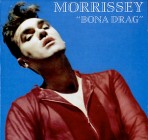Music Nerd: Emotive Frontmen Edition
 Singles by Future Islands
Singles by Future Islands
I felt particularly let down by the internet when I discovered Future Islands through, of all things, a performance on David Letterman’s show (that, granted, I then watched on the internet, but still). Here I thought I was on the cutting edge! My nerd-offense aside, good for them. They went on TV, and knocked their performance out of the park. Singer Samuel T. Herring emotes with his voice and gestures like he’s in some kind of interpretive dance version of Death of a Salesman, and this is the performance that will determine the troupe’s funding for the coming year. As dramatic as it is, though, his performance never comes across as a put-on. Indeed, it is his intense sincerity that is so arresting, so beautiful. He’s laying it all out there.
The record makes good on the promise of this performance. Musically, it’s right up my alley: emotional synth-pop, driven forward by fuzzy post-punk bass. The band provides the perfect bed Herring’s moving warbles and confessional lyrics. He doesn’t dip very often into the kind of heavy-metal muppet voice on this album that he affects during the Letterman performance; when he does, such as on the heartbreaking Fall From Grace, the effect is perfectly jarring. I am not the first to sing this album’s praises; a few reviewers have compared it to Orchestral Manoeuvres in the Dark’s, well, oeuvre, and I don’t think that’s un-apt, though certainly that’s not the only influence at play here (OMD’s own Andrew mccluskey wrote an excellent review and he doesn’t think so either.) All of the praise, to me, seems very deserved. After touring hard and recording three previous albums, these guys have reached a new level in their career. 2014 may very well be the year of Future Islands.
 Autobiography by Morrissey
Autobiography by Morrissey
Surprise! This is actually a book review!
I am a huge Morrissey fan (he is coming to Lawrence next month and I am crazy excited) so I was definitely looking forward to this book as soon as I heard it would be a thing. It is every bit as caustic, witty, and expertly-phrased as one would expect from the Mozzer, but also quite tender in many places. The early part of the book, which describes his upbringing in working-class Manchester, and the cruelties and humiliation suffered within the catholic school system there, is enough to illuminate where so much of the bitterness that characterizes his public image comes from. The fitful journey from there to sold-out stadiums and legions of fans is thrilling to behold.
I had only three real complaints with the book: firstly, it could have used a bit more copyediting--but then again, who wants to try to edit the man who famously penned the lyric “You shut your mouth / how can you say / I go about things the wrong way?” Second, as many reviewers have pointed out, the section concerning the royalty litigation of former band member Mike Joyce drags on far too long. Obviously, Moz feels he was greatly wronged, and he may have been, but enough already. Third, and my personal biggest disappointment is that there is not much discussion of his actual songwriting process. As a sometime-songwriter myself, this is the kind of thing that I am most interested in; I really wanted a little more of the nuts and bolts of songs like I Know It’s Over, or Everyday Is Like Sunday came together.
That said, this book probably isn’t the way to win any new converts to The Church of Morrissey. If you already hate him, it won’t change your mind. If you just haven’t given his music much of a shot, however--well! Isn’t it nice that you have your friendly neighborhood Music Nerd here to help?
 Morrissey Primer
Morrissey Primer
The Morrissey/Smiths discography is definitely pretty daunting, given the sheer size and its respected stature within the indie community. My advice is to ignore both of those factors completely if you can. Start with either Louder Than Bombs for The Smiths, or Bona Drag for Morrissey’s solo career. Spend some time with each, get to know the songs. Pretend, while you are listening, that no one else has ever heard of this artist, and these are the only releases under his belt; let the music stand on its own, out from under the weight of history. If you like it, go from there! Hoopla has full discographies for The Smiths and Morrissey, and we have many of them on CD at the library as well, so there’s really no reason not to explore. I could write a much more detailed roadmap from there, but someone’s already beat me to it for Morrissey’s solo work (though I would add that the b-sides collection Swords, which came out after that article was written, might be an excellent entry-point to his late-period career.) As far as the Smiths, listen to The Queen Is Dead next, and if you’re not a fan for life, you’ll probably straight-up hate them. There doesn’t seem to be much middle ground where Morrissey’s concerned.













